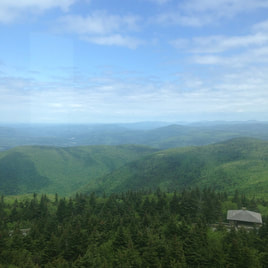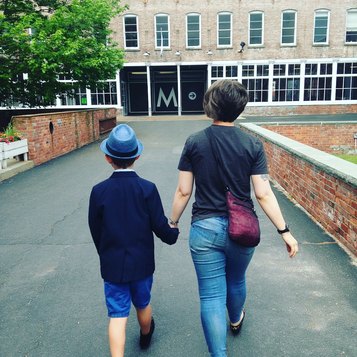 Earlier this summer I visited one of my oldest friends. She is now the mother of two exceptional tiny humans and part of the joy of our visit was getting to adventure along with them for four days. I expected a lot of story reading, dance parties, toy cars, and lots of giggling. And as I listened to these two little beings sing songs, make up riddles, and jump off of impossibly high ledges, I could not stop staring at the one who was six years old and think, Is that always how young six has been? My dad died when I was six. My-dad-died-when-I-was-six. MydaddiedwhenIwassix. The sentence that I have said for more than a quarter century now has become one word, one sound. I’ve said it so often and perfected the detached delivery of it, that it has almost lost its meaning. But of course, that experience can never truly lose any meaning at all. It can morph, it can wax and wane. But it is ever-present, defining my life since it became my reality. It compelled me to grow up quickly. It triggered anxiety, depression, and a deep longing for stability almost impossible to describe that I carry still. I was chronically tired at school because I was afraid to sleep at night. I skipped school and missed social events because I did not want to be separated from my mother. I had concocted an elaborate plan if I should be unlucky enough to experience this again, waking one morning to find my mother dead too. I had an overnight bag packed and hidden in the back of my closet that I would retrieve, escape to my friend’s home, and set up camp before I was whisked away to a foster home. I spent my insomniac hours rehearsing my prepared persuasive speech to be delivered to my friend’s parents upon my arrival, convincing them to let me live there. I made mental provisions for the family dog, and tallied what I knew how to cook should circumstances be that I had to fend for myself as an orphan. MydaddiedwhenIwassix. Six. Because I had spent that year coming to terms with death, planning for my own care, and imagining the worst case scenario each time my mother left me anywhere, I think of six as practically a teenager. My first social work job was with refugee youth and my coworkers marvelled at the things our young clients had overcome. I was moved of course, but it made sense to me. Of course they took care of themselves, I thought. They weren’t babies! They were already six! This photo was taken at Greylock Mountain on that visit with my childhood friend and her children--one of them, you guessed it: six years old. All week I had listened to him mispronounce words, ask for help getting into his jacket, and struggle to process anger when his younger brother took his toy. And as we began to climb the lookout tower at the mountain, he looked up to me and said “Aunt MarMar, can I hold your hand? This looks kinda scary.” And it was scary. He’s six. We were climbing three flights of a spiral staircase, crowded by strangers, to look off the side of a mountain. And as I took his hand, thinking to myself, “Of course--he’s six” something clicked for me and I thought, “And you were six. You were only six.” We never know when our grief and past trauma will come flying back to us, reminding us that we are never just our present adult self. We are always an adult who was also once a child. We carry whatever experience that was, the full spectrum of its joy and sorrow, with us to the end. I spent the last day of my trip encouraging my friend's kids in their childlike behavior. I awed at their imaginations, their spongey brains learning by the second. And another part of my healing began, as I let a six year old teach me how to be six. Ready to learn more about childhood trauma? Do you want to learn about childhood grief through a mixture of research, best practice clinical intervention, weaved with Mary-Margaret sharing more of her story as a case study? Visit the training page to learn more about booking a training.
0 Comments
Leave a Reply. |

 RSS Feed
RSS Feed